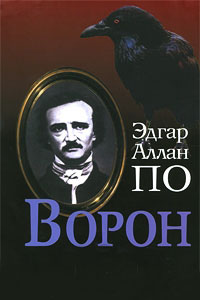
|
||
|
|
Онлайн книга - Ворон | Автор книги - Эдгар Аллан По
Cтраница 1

Ни одно художественное произведение не переводилось на русский язык так часто, как это стихотворение Эдгара По. Существует более двух десятков переводов "Ворона". Уступил даже знаменитый монолог Гамлета "Быть или не быть": его переводили "всего" шестнадцать раз. Первые русские переложения "Ворона" появились в 1878 году. А классическими считаются переводы, сделанные символистами: Бальмонтом, Мережковским, Брюсовым. Константин Бальмонт написал также очерк о жизни и творчестве американского поэта, который до сих пор продолжают использовать в качестве предисловия к сборникам избранного и собраниям сочинений Эдгара По. Разумеется, "Ворона" переводили и в советское время и продолжают переводить до сих пор. Особенно интересно проследить, как искали переводчики русский эквивалент ключевому слову "Невермор". Андреевский сто двадцать лет назад перевёл буквально: "Больше никогда!" Его современник Пальмин ограничился одним "Никогда". Брюсов и Мережковский последовали примеру Андреевского, Бальмонт – Пальмина. Однако оба варианта страдали одним существенным недостатком: пропала фонетическая нагрузка, то есть два "р" ("Невермор!"), которые позволяли Эдгару По соединить человеческую речь и воронье карканье. В 1907 году переводчик Жаботинский нашёл выход: он отказался от поисков русского аналога и оставил английский оригинал – "Невермор!" После чего поиски поиски в этом направлении на целых полвека прекратились. Лишь в 77-ом году появился новый русский эквивалент. Василий Бетаки отдал предпочтение "каркающему" "не вернуть". В восьмидесятые годы Николай Голь нашёл ещё один вариант: "всё прошло". (C)Ефим Шуман, 1999 Edgar Allan Poe The Raven 1845
Once upon a midnight dreary, while I pondered, weak and weary, Over many a quaint and curious volume of forgotten lore- While I nodded, nearly napping, suddenly there came a tapping, As of some one gently rapping, rapping at my chamber door. "'Tis some visitor," I muttered, "tapping at my chamber door- Only this, and nothing more." Ah, distinctly I remember it was in the bleak December; And each separate dying ember wrought its ghost upon the floor. Eagerly I wished the morrow;- vainly I had sought to borrow From my books surcease of sorrow- sorrow for the lost Lenore- For the rare and radiant maiden whom the angels name Lenore- Nameless here for evermore. And the silken, sad, uncertain rustling of each purple curtain Thrilled me- filled me with fantastic terrors never felt before; So that now, to still the beating of my heart, I stood repeating, "'Tis some visitor entreating entrance at my chamber door- Some late visitor entreating entrance at my chamber door;- This it is, and nothing more." Presently my soul grew stronger; hesitating then no longer, "Sir," said I, "or Madam, truly your forgiveness I implore; But the fact is I was napping, and so gently you came rapping, And so faintly you came tapping, tapping at my chamber door, That I scarce was sure I heard you"- here I opened wide the door;- Darkness there, and nothing more. Deep into that darkness peering, long I stood there wondering, fearing, Doubting, dreaming dreams no mortals ever dared to dream before; But the silence was unbroken, and the stillness gave no token, And the only word there spoken was the whispered word, "Lenore!" This I whispered, and an echo murmured back the word, "Lenore!"- Merely this, and nothing more. Back into the chamber turning, all my soul within me burning, Soon again I heard a tapping somewhat louder than before. "Surely," said I, "surely that is something at my window lattice: Let me see, then, what thereat is, and this mystery explore- Let my heart be still a moment and this mystery explore;- 'Tis the wind and nothing more." Open here I flung the shutter, when, with many a flirt and flutter, In there stepped a stately raven of the saintly days of yore; Not the least obeisance made he; not a minute stopped or stayed he; But, with mien of lord or lady, perched above my chamber door- Perched upon a bust of Pallas just above my chamber door- Perched, and sat, and nothing more. Then this ebony bird beguiling my sad fancy into smiling, By the grave and stern decorum of the countenance it wore, "Though thy crest be shorn and shaven, thou," I said, "art sure no craven, Ghastly grim and ancient Raven wandering from the Nightly shore- Tell me what thy lordly name is on the Night's Plutonian shore!" Quoth the Raven, "Nevermore." Much I marvelled this ungainly fowl to hear discourse so plainly, Though its answer little meaning- little relevancy bore; For we cannot help agreeing that no living human being Ever yet was blest with seeing bird above his chamber door- Bird or beast upon the sculptured bust above his chamber door, With such name as "Nevermore." But the Raven, sitting lonely on the placid bust, spoke only That one word, as if his soul in that one word he did outpour. Nothing further then he uttered- not a feather then he fluttered- Till I scarcely more than muttered, "Other friends have flown before- On the morrow he will leave me, as my Hopes have flown before." Then the bird said, "Nevermore." Startled at the stillness broken by reply so aptly spoken, "Doubtless," said I, "what it utters is its only stock and store, Caught from some unhappy master whom unmerciful Disaster |
|
|||||||||||||||||||||||||||||||||||||||||||||

 Вернуться к просмотру книги
Вернуться к просмотру книги
 Перейти к Оглавлению
Перейти к Оглавлению
 © 2020 LoveRead.ec - электронная библиотека в которой можно
© 2020 LoveRead.ec - электронная библиотека в которой можно